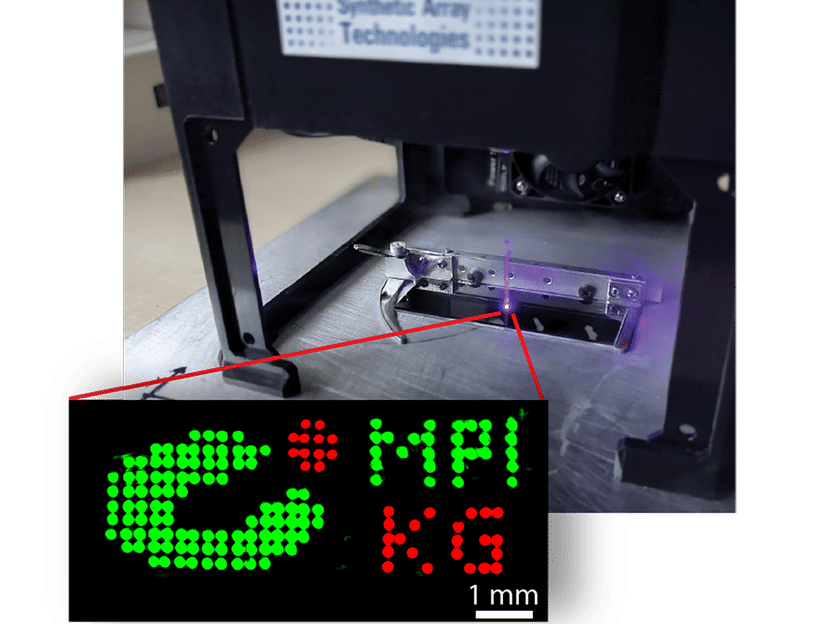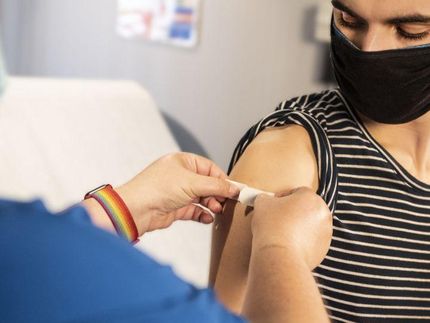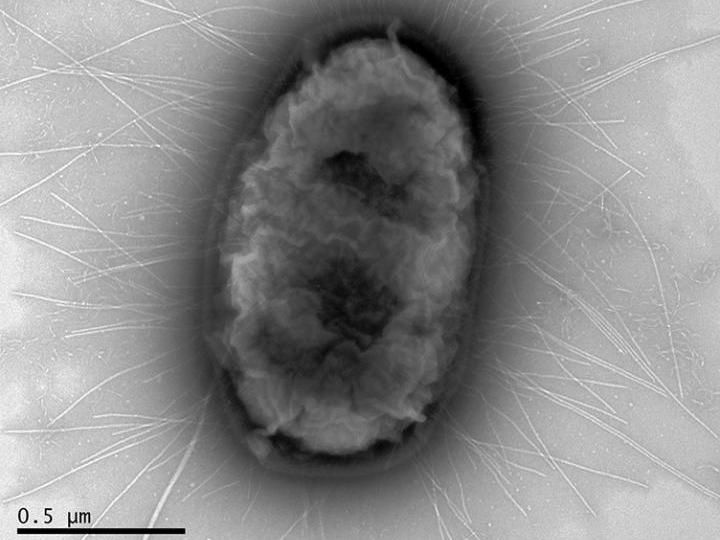Diagnostics for everyone
Researchers present a cost-effective machine for the production of microarrays
microarrays are state-of-the-art tools in molecular biology that enable the rapid and parallel diagnosis of various diseases. Therefore, they are indispensable for the development of new vaccines. Like a computer chip, microarrays contain a lot of information in the smallest space. Microarrays contain thousands of different biomolecules on a surface of a few square centimeters, which can be analyzed in a single experiment. The production of such microarrays has been very expensive and required complex machinery.

Production of a microarray with the cost-effective DIY setup. A laser from a Blu-ray player accurately transfers minute amounts of biomolecules to a surface with up to 2 500 spots per square cm².
Max Planck Institute of Colloids and Interfaces
Cost-effective, laser-based method
Therefore, the research group of Felix Loeffler develops cost-effective processes and researches novel technologies for the chemical production of microarrays. Similar to the principle of a typewriter, a laser can transfer small polymer nanosheets, containing certain colors or chemical building blocks, in finely defined dot patterns. Subsequently, these molecules can chemically react to complex artificial structures, representing, for example, parts of a pathogen. These microarrays are then used for vaccine research or blood testing. So far, however, this technique could only be used by a few specialists.
DIY microarrays
In a collaboration of the departments of "Biomolecular Systems" and "Colloid Chemistry", Eickelmann et al. present a cost-effective approach to generate microarrays and show a first application in carbohydrate research. Based on a low-cost commercial laser engraver, employing simple components of consumer electronics (Blu-ray player), they developed a very simple system. In addition, they made a spin coater from remaining components, which serves to produce the (color) donor surfaces. Thus, all steps for microarray production can now be performed in any chemistry lab in the world without any special equipment. The total cost of this system is less than 200 euros, which is 200 times cheaper than a conventional device.
Felix Löffler, senior scientist, emphasizes: "The principle is suitable for many different applications and also offers great potential for basic research. It is suitable for the parallel development of new chemical reactions, as well as, for use in disease research, for the synthesis of proteins, sugars, and DNA."
Original publication
Stephan Eickelmann, Alexandra Tsouka, Jasmin Heidepriem, Grigori Paris, Junfang Zhang, Valerio Molinari, Marco Mende, Felix F. Loeffler: "A Low‐Cost Laser‐Based Nano‐3D Polymer Printer for Rapid Surface Patterning and Chemical Synthesis of Peptide and Glycan Microarrays"; Advanced Materials Technologies; 2019
Most read news
Original publication
Stephan Eickelmann, Alexandra Tsouka, Jasmin Heidepriem, Grigori Paris, Junfang Zhang, Valerio Molinari, Marco Mende, Felix F. Loeffler: "A Low‐Cost Laser‐Based Nano‐3D Polymer Printer for Rapid Surface Patterning and Chemical Synthesis of Peptide and Glycan Microarrays"; Advanced Materials Technologies; 2019
Organizations
Other news from the department science

Get the life science industry in your inbox
By submitting this form you agree that LUMITOS AG will send you the newsletter(s) selected above by email. Your data will not be passed on to third parties. Your data will be stored and processed in accordance with our data protection regulations. LUMITOS may contact you by email for the purpose of advertising or market and opinion surveys. You can revoke your consent at any time without giving reasons to LUMITOS AG, Ernst-Augustin-Str. 2, 12489 Berlin, Germany or by e-mail at revoke@lumitos.com with effect for the future. In addition, each email contains a link to unsubscribe from the corresponding newsletter.






















































